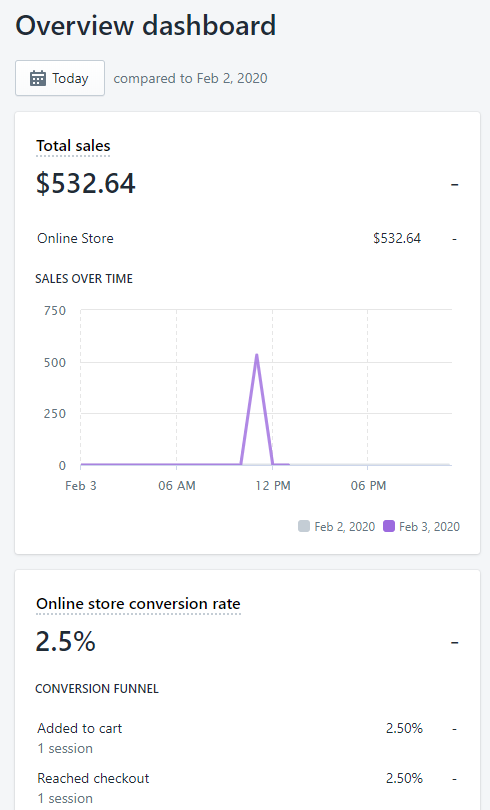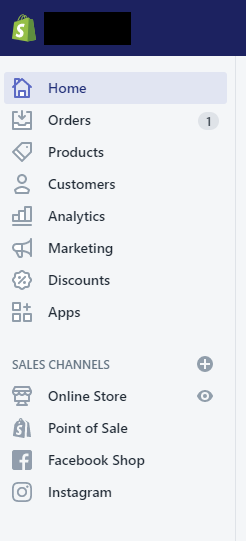Shopify offers an excellent e-commerce content management system complete with many exciting features, such as selling on Pinterest, Facebook, and Instagram. It's a pretty good choice for entrepreneurs looking to launch an online store quickly.

Starter Plan: $5 per month
Basic Plan: $29 per month
Shopify Plan: $79 per month
Advanced Shopify: $299 per month
ShopifyPlus: $2,300 per month
Discounts for pre-paid annual and biennial subscriptions
-
Ease Of useRating image, 4.50 out of 5 stars.4.50/5 Our ratings are based on a 5 star scale. 5 stars equals Best. 4 stars equals Excellent. 3 stars equals Good. 2 stars equals Fair. 1 star equals Poor. We want your money to work harder for you. Which is why our ratings are biased toward offers that deliver versatility while cutting out-of-pocket costs.
= Best
= Excellent
= Good
= Fair
= Poor
SupportRating image, 4.50 out of 5 stars.4.50/5 Our ratings are based on a 5 star scale. 5 stars equals Best. 4 stars equals Excellent. 3 stars equals Good. 2 stars equals Fair. 1 star equals Poor. We want your money to work harder for you. Which is why our ratings are biased toward offers that deliver versatility while cutting out-of-pocket costs.
= Best
= Excellent
= Good
= Fair
= Poor
PricingRating image, 4.00 out of 5 stars.4.00/5 Our ratings are based on a 5 star scale. 5 stars equals Best. 4 stars equals Excellent. 3 stars equals Good. 2 stars equals Fair. 1 star equals Poor. We want your money to work harder for you. Which is why our ratings are biased toward offers that deliver versatility while cutting out-of-pocket costs.
= Best
= Excellent
= Good
= Fair
= Poor
FeaturesRating image, 3.50 out of 5 stars.3.50/5 Our ratings are based on a 5 star scale. 5 stars equals Best. 4 stars equals Excellent. 3 stars equals Good. 2 stars equals Fair. 1 star equals Poor. We want your money to work harder for you. Which is why our ratings are biased toward offers that deliver versatility while cutting out-of-pocket costs.
= Best
= Excellent
= Good
= Fair
= Poor
-
- Fully hosted with no maintenance costs
- Multichannel retail capabilities
- Simple user journey
- Limited customization options
- Free trial but no free plans
In order to build a booming e-commerce business, you need an easy-to-use website with a manageable content strategy. Fortunately, one of the kings of e-commerce is the Shopify website builder. This tool makes it simple and easy to launch your online store and manage your site.
With clickable builds and preloaded templates, your primary focus can be on building sales, meaning you need no technical or design background. The features that come standard with this software focus on efficient sales and boosting revenue -- as well as managing the customer journey.
Who is Shopify for?
Shopify is entirely built for the e-commerce world (seriously, there are millions of Shopify stores out there), so it's a pretty good choice for someone looking to launch an online store. As a site builder, it's designed for entrepreneurs and business owners and requires no coding knowledge.
The average Shopify customer is trying to sell wares and build a brand, not code for hours and build a custom interface, and Shopify's ease of use reflects that.
It's built for business owners who are ready to launch their online store without worrying about setup time and technical headaches.
Shopify's features
There are a plethora of Shopify tools to help you build your very best shop. Each one is created with an e-commerce slant, so even content management and page-building come second to sales. However, the simplification means you can focus on e-commerce activity.
Hosting
One of the best things about Shopify is that it's a fully hosted solution. You don't need to stress about buying and managing extra external software, paying for hosting, or hiring a developer to wade through the building and domain stuff for you.
Shopify's a very "out of the box" solution, streamlining your work from the very start.
Exchange marketplace
There's a whole microcosm of pre-built possibilities that are exclusive to Shopify via the Shopify Exchange.
If building a store from the ground up is not your strong suit, or you simply don't have time to start a business from scratch, there's an entire marketplace of already-built Shopify stores available for purchase. Generally, the Exchange offers over 3,000 sites available at any given time.
The entire process is run as a part of Shopify itself, too, so it's not some shady, black-market deal. You can opt to purchase a successful business from the start if you have the cash.

The Exchange has browsable listings of current Shopify stores for sale. Image source: Shopify.com
You can buy starter stores for relatively cheap, or purchase a thriving e-commerce site. Depending on your criteria, buying a shop can cost as little as $50 for a brand-new one, or the price can climb to over $1 million for established, successful pages.
Think of this as if you were buying or taking over a physical store. The concept is the same in that you are taking ownership of a proven, thriving business without the financial risk of starting from scratch.
Rather than creating your own business from the ground up, the Exchange allows you to buy out another business, essentially taking the brick-and-mortar concept of a store being "under new management" to the online world.
If you have the cash to purchase a fully operational and profitable store, you have an excellent investment opportunity, all without having to come up with the products yourself. You get a working store, an established brand, a loyal customer base, and so on, and all you need to do is purchase it, as you take ownership the same day.
Plus, Shopify provides the accurate stats and metrics of the store, so you have full transparency into sales and other valuable data.
You can also purchase a functional store that is perhaps not hugely successful but starting out. This still saves you from having to kickstart a brand from nothing, while allowing you to continue and develop it in your own way.
Analytics integrations
What's really cool about Shopify is that you have the option to integrate with Google Analytics as well as take advantage of Shopify's built-in platform.

You can check out your sales, online conversions, and more right from Shopify's analytics dashboard. Image source: Shopify.com
Since Shopify is an e-commerce beast, it prioritizes your ability to track your store's success. You can break down views of sales by month, week, day, or even by hour chunks during a single day. Important marketing metrics such as conversion rates, add-to-cart data, abandoned carts, and completed checkouts are shown at a glance.
Easy product management
Uploading products and maintaining your inventory is very easy. You can publish posts that tie into product offerings and link your content plans to your actual sales goals.

Shopify lets you add all product information including pricing and inventory from a single screen. Image source: Shopify.com
When you sell on Shopify, you're given a window into streamlined inventory management. By syncing your inventory items with Shopify (aka the point of sale), you're assured of accurate pars (minimum in-stock inventory) based on sales. Plus, completing inventory checks is made easier because products are displayed in a simple list, with par levels and descriptions clearly shown.
Not only does this make it easier for your customers to buy items, it makes your back-end management much less hectic, too.
Marketing integrations
With Shopify, you have access to a slew of additional applications. Shopify also specifically highlights marketing add-ons to help you organize your content and integrate your marketing plans.

From social media marketing to email marketing and beyond, Shopify has plug-ins for whatever you'll need. Image source: Shopify.com
Outside of the primary inclusions, which are helpful, you can up your marketing game with advanced social media integrations (such as advertising on Snapchat), fine-tune your marketing automation email process, personalized sales emails, and much more.
Integrated email
Shopify leads the way with e-commerce email marketing by having the email feature integrated right into it. Based on actions your customers take when interacting with your storefront, you can use Shopify Email to base campaigns on those behaviors all from one platform.
Without the need for a secondary software, you can run campaigns, set up automated follow-up emails, and advertise sales with minimal setup, which is a blessing when you have more important things to do.
Shopify themes
As with any of the best e-commerce software, there are several Shopify themes available for your site.

An example of one of the free themes you can choose in Shopify, though premium designs are available as well. Image source: Shopify.com
Picking a theme is easy: You can browse through options and further customize each possibility by changing the default colors to those of your brand, uploading your company logo, and determining what's displayed on the homepage.
Customer tracking
It's easy to manage the lifecycle of a customer because, as an e-commerce website, Shopify is designed to track that behavior closely.

Add new customer information from the New Customer page in Shopify. Image source: Shopify.com
Having this information available makes it easier to set up marketing campaigns that target the right people, predict inventory needs, and plan sales.
Order tracking
It's not just people you can track. With Shopify's integrated shipping tracker, you can see and manage the status of placed and shipped orders. With a few simple clicks in your settings, you can turn on tracking update emails for customers, and you can keep an eye on order statuses yourself.
Shopify's ease of use
"Easy to use" can be somewhat subjective, but Shopify manages to nail all of the basic requirements. It's a system anyone can understand even if you've never built a website, but it doesn't sacrifice on capabilities.
Right from purchase, you can have an already-working online store, meaning you aren't building a shop brick by brick, so to speak, but rather adjusting and fine-tuning the existing design to suit you better.
Ready-made templates ensure seamless designs and are automatically responsive and optimized for multiple devices. Shopify's dashboards and toolbars are easy to understand.

The basic dashboard for Shopify is clean and easy to navigate. Image source: Shopify.com
A common worry in e-commerce is the sensitivity of payment information, but Shopify handles online payments for you, alleviating the stress of storing private customer information. Your products and inventory are easy to manage, and social media sales integrations are only a click away.
Shopify's pricing
Though there are no free plans available, the pricing tiers for Shopify are reasonable. You can opt for monthly or annual billing and choose from one of three regular plans Shopify Basic, Shopify, or Shopify Advanced, along with two alternative plans: Shopify Starter and ShopifyPlus. The prices below represent the cost of an annual membership divided by twelve. If you actually pay month to month, instead of by the year, prices increase by roughly 33%.
- The Shopify Basic plan is $29 per month.
- The Shopify plan is $79 per month.
- The Advanced plan, which offers premium reporting and lower credit card rates, is $299 a month.
If none of these plans work for you, Shopify also offers two alternative solutions: a Starter plan for $5 a month and ShopifyPlus, which is $2,300 a month and is designed for high-volume sales.
The Shopify Basic plan offers a lot of features, and depending on your needs, you might not need to upgrade for a while. The basic plan offers full access to the online store model, the POS system for collecting payments offline, and Facebook and Pinterest integrated selling. It also includes the ability to add a custom Shopify "buy" button to pages that aren't necessarily part of your online store, allowing for increased sales opportunities.
Keep in mind, though, that if you're not using the Shopify Payments feature, you do get charged a transaction fee for every order placed.
Shopify's support
Shopify's support is top tier. Not only are there a multitude of online resources, step-by-step instructions, and video tutorials, Shopify also offers access to a customer representative 24/7. You can call toll free or start by submitting a ticket online through the support portal.
Shopify representatives have a reputation for being quick to respond and helpful with their answers, and I found that to be true when contacting support via an online request.
There's also a very large customer base of Shopify users, so the community forums are a bastion of support.
Benefits of Shopify
If e-commerce is your primary focus, Shopify is one of the best options we've come across. The pricing is generally affordable, with the Starter plan available for $5 a month, and the Basic plan coming in at less than $30 per month, so the risk with these options is lower.
The ease-of-use factor can't be overstated, either, as you're presented with a working e-commerce platform directly at purchase. All you need to do is the nontechnical tweaking to make it match your business, which means you're never in danger of building a nonworking site or setting yourself up for a frustrating experience.
If you're stuck, there are a plethora of support options to solve almost any problem. You're never alone with an issue, and security is top notch, too.
Shopify is an e-commerce mainstay for a reason
Though there are certainly pros and cons to Shopify, if your main focus is e-commerce, it's one of the best options available. For online storefronts, you need a site builder and content manager that understands selling and inventory management first, along with a user-friendly setup.
Shopify makes growing sales and managing an e-commerce site about as easy as it can ever be.
How Shopify Compares
| Mobile Capabilities | Fast Loading Speed | SEO | Free Plans | |
|---|---|---|---|---|
| Shopify |
|
|
||
| Magento |
|
|
||
| Squarespace Commerce |
|
|
||
| WooCommerce |
|
|
|
|
| Volusion |
|
|
|
FAQs
-
No, there are no free plans, but you can start with a free trial to make sure it's the right fit. Plans are priced affordably, too.
-
With Shopify Online Payments, you can integrate the sales process through the site itself, with sensitive information kept secure. It's also conveniently integrated with PayPal.
-
There is no product cap. Every plan allows unlimited products.

Our Small Business Expert
We're firm believers in the Golden Rule, which is why editorial opinions are ours alone and have not been previously reviewed, approved, or endorsed by included advertisers. The Ascent does not cover all offers on the market. Editorial content from The Ascent is separate from The Motley Fool editorial content and is created by a different analyst team.